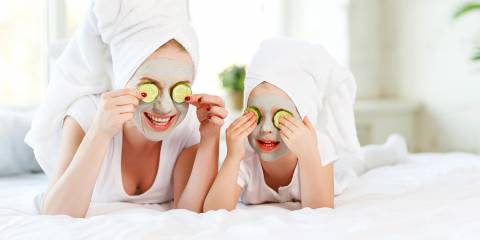If you’re a woman of a certain vintage, you don’t need to be told that age makes itself known through crow’s feet around the eyes, vertical lines above the upper lip, and creases that stretch from nose to mouth.
For some reason, we tend to feel guilty—or resentful—about these developments, even though they happen to everyone.
Aging Agents
The culprits include free radicals created in the body whenever oxygen is used to produce energy. Which is all the time. These highly reactive, unpaired molecules steal electrons from other molecules, damaging skin in the process.
As we age, the structural proteins of collagen and elastin also begin to break down, causing facial skin to sag and lose its definition. The sun makes things worse through a process called photoaging, which leads to wrinkles and other signs of premature aging.
Throw in a bad night’s sleep, and going under the knife can seem tempting. But science shows that we have many powerful alternatives at our disposal. Best of all, these cutting-edge tools won’t hurt a bit.
Ace Your Face
Eating fruits and vegetables, and the antioxidants they contain, may be the healthiest way to maintain youthful-appearing skin, according to research. For extra support, think ACE for vitamins A, C, and E. Taken together in supplement form, these powerful antioxidants can protect the skin against ultraviolet damage, which is public enemy number one. Scientific evidence indicates that topical application of retinoids—compounds derived from vitamin A—improves mild to moderate photodamage by smoothing skin texture and promoting collagen formation.
Vitamin C also increases collagen production and helps brighten and smooth the skin. In moisturizers, look for stabilized C derivatives including L-ascorbic acid, magnesium ascorbyl phosphate, and ascorbyl palmitate.
If you’re using a topical serum form of vitamin C, apply it at night. “By helping to quench free radicals, vitamin C prevents tissue irritation and damage on a cellular level, which—among other things—helps keep skin looking youthful and clear,” according to Lisa Drayer, MA, RD, author of The Beauty Diet.
Vitamin E rounds things out, protecting against UV rays and helping the skin retain moisture.
Iron It Out
In vivo research indicates that resveratrol is a potent antioxidant that can help protect skin against the effects of UV exposure and DNA damage. Although it’s found naturally in grapes and red wine, taking resveratrol supplements is a far more effective way to reap its benefits. Recent research also shows that delivery through the skin itself may be the optimal way to achieve its therapeutic effects, so look for this ingredient in moisturizers and creams.
Pomegranate also shows promise in the wrinkle department. Nutrient- and antioxidant-rich, the extract of this superfruit protects against sun exposure, helps prevent fine lines, and helps to firm skin. In vivo research indicates that goji berry may possess similar properties.
Green tea extract shows great potential in topical skin care products. Green and white teas, especially combined with mangosteen and pomegranate extracts, improve age-related changes in the skin.
As we age, our naturally produced collagen, which gives facial skin its tightness and firmness, declines. Research shows supplementation with collagen peptides decreases skin wrinkles and improves skin moisture.
Other Tools
DMAE (dimethylaminoethanol) is a natural substance (found in salmon) that improves facial muscle tone and protects cells from free-radical damage.
Nature also provides us with friendly acids that help keep skin looking younger. Hyaluronic acid, a great humectant, holds up to 1,000 times its weight in water and locks in moisture.
Found naturally in certain vegetable oils, linoleic and linolenic acids also increase the skin’s ability to retain water for a plumper, more youthful look. Argan oil contains both vitamin E and linoleic acid. Alpha lipoic acid preserves other antioxidants like vitamins C and E, protects DNA, minimizes facial creases, and reduces under-eye puffiness.
The Whole Picture
If you choose plastic surgery, nature provides ways to help you heal. “I recommend homeopathic medications, including Arnica montana in oral and topical forms to help naturally reduce pain, bruising, and swelling after a procedure,” says New York–based surgeon Shirley Madhere, MD, PC.
To learn more about Dr. Madhere’s “holistic plastic surgery” practice, which includes pre-procedure advice on nutrition, detoxification, and exercise, visit www.thenewaesthete.com.





